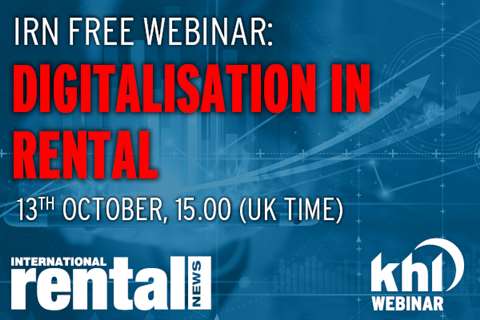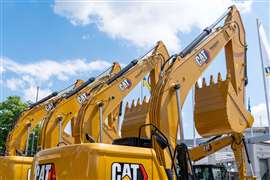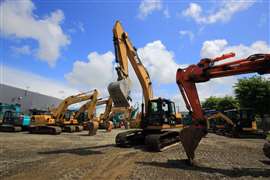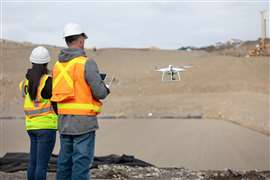Rental management: Going online
05 October 2020
Rentaga: Strength in numbers
It is widely recognised that the construction industry – and, within it, the equipment rental sector – is under-digitalised compared with other industries. Before the Covid-19 pandemic brought this into sharp focus for everyone, Jacques Valckenaere and Hanne Hejgaard saw a gap in the market for a digital rental platform. They saw services like Booking.com for the hotel industry and Skyscanner for comparing flights online, but no equivalent for equipment rental.
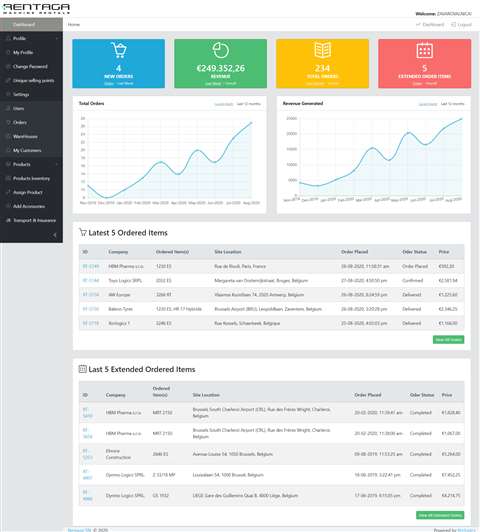
So, in 2016, the concept of Rentaga began to take shape, as an online space where contractors can compare and rent equipment from various suppliers.
Valckenaere – the company’s CEO – and Hejgaard – its Advisory Board – crossed paths when working for telematics provider Trackunit. Valckenaere was OEM Partnership Manager at the company from 2009 to 2016, while Hejgaard served as Country Manager for the BeNeLux markets between 2012 and 2016.
They each have about fifteen years’ experience in the construction equipment industry; Hejgaard says, “We know the environment very well, both on the supplier side and on the customer side.”
In 2018, they met Junaid Jalap, a computer scientist who has been working at a technical and management level in IT companies for more than 18 years. Together, they spent a year developing the Rentaga platform, with Jalap acting as the Chief Information Officer.
Technology roadmap
“I am mostly responsible for the end-to-end product development and defining the technology roadmap for the platform,” says Jalap.

The fourth founder, investor Michel Ehrlich, has helped to provide the capital necessary to get the platform off the ground. Collectively, the four founders have invested just over €250,000 and are now in the process of raising €1.5 million for the next phase of development.
Rentaga launched at the start of 2020, starting in Belgium and Luxembourg; “We are now moving halfway into Holland,” says Valckenaere, adding that they are close to closing some partnership agreements with Dutch rental companies.
He says, “Our intention is to go across Europe.”
Explaining how the platform works, Valckenaere says rental partners make available their equipment on the platform and then customers can log in to search for and rent products.
Although the concept of Rentaga might be simple, the execution is a little more complex.
“Ideally, we would have a fully-automated approach where we could connect through a rental partner’s ERP [enterprise resource planning] so that we have a real-time inventory from their system and we could submit orders in real-time to their system,” says Jalap. “But that was a challenge because the rental firms aren’t up-to-date on that side.”
So Rentaga has had to adapt, making the process less automated. Rental partners instead upload their inventory through a CSV file or Excel sheet.
“This means we have an unlimited stock amount from them,” says Valckanaere, “because this industry typically doesn’t say no. So even if they have only five excavators themselves, and somebody wants two more, they’re going to move heaven and hell to provide them by re-renting them from a competitor, typically.”
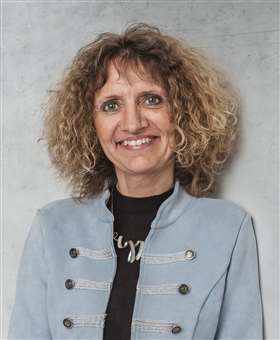
Model information
To reduce the burden on rental partners of inputting the details of all their available equipment when they join the platform, Rentaga is working with OEMs to get them to supply the relevant information for all the models they have on the market. This way, Rentaga ensures that all the names, model numbers, descriptions and images are correct and standardised.
“So we will have central control on the product database,” says Jalap, “and whenever a new partner or supplier joins our platform , they can just associate those products in the inventory.”
In return, the OEMs are given the opportunity to freely announce the launch of new equipment and services via banners on the platform, promoting those products to end consumers and rental companies simultaneously.
“Eventually, we intend to make it a global database of equipment,” says Jalap. Although this function is not fully accessible to OEMs yet, Rentaga so far has commitment from Manitou, Genie and JLG.
Not all types of equipment will be listed on the platform though. For example, Hejgaard says, “We might not have a very specialised machine or a very specialised crane where you would need an operator to work with the machine. In these cases, the customer will still need to go to the rental company and get advice and discuss how to do the job.

“So it is not the case that we are eliminating all the rental with the partners; we are more taking what we call the automated orders. A lot of people in this business know exactly what they want – they know what brand they want, which type of machine – and this is where the platform is brilliant.”
Recognising that rental companies are concerned about price wars, Rentaga gives its rental partners the ability to highlight their unique selling points, such as 24-hour service, to explain their pricing.
Valckenaere likens it to booking a hotel room on a comparison site; “You don’t necessarily go for the cheapest room; you maybe go for the room with breakfast because you always have breakfast.”
Rentaga also acknowledges that rental customers are often loyal to their suppliers because, quite aside from pricing, they must feel they can rely on a rental company to supply good-quality equipment on time.
“So what we developed on our platform is a feature allowing the suppliers to recognise their preferred customers so that there is a VAT match, ensuing that these customers will get their negotiated prices right away,” says Hejgaard.
The rental partners have a dashboard where they can add equipment, define prices and set up discounts. Those discounts can be applied across all their equipment or only to specific groups of equipment, and for all customers or just individuals.
They are also able to view their turnover on the platform and see running orders.
Customers also have a similar dashboard through which they can access their history on the platform.
How does Rentaga differentiate itself from other equipment rental aggregators though?
Valckenaere says, “There are some actors in Belgium, England, France and Germany that have very similar businesses, but still different. They also have an e-platform but then they start to broker whatever they have collected as rental propositions with rental companies.
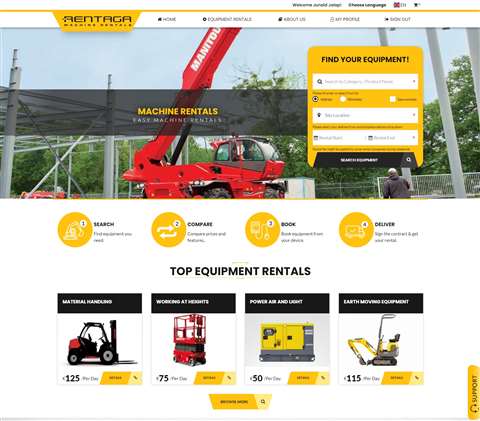
“That means, on those platforms, you can only put in a request for a booking, they go and shop around and will confirm what you requested with a rental company.
“On our platform, you can book immediately because we have a commitment from our partners that whatever they put on our system is one-to-one bookable. So we are really a direct booking organisation like Booking.com, and not a broker like Ritchie Bros.”
Acting as intermediary
So Rentaga is just an intermediary, putting customers in contact with rental firms and taking a percentage of the rental fee directly from the supplier. The rental companies themselves are responsible for the logistics, servicing, invoicing, and so on.
Valckenaere says, “The rental companies prefer this model to an intermediary who doesn’t say who the end customer is because, at the end of the day, a Klarx, a ClickRent, a SmartYard, they come with a proposal to, let’s say, Lavendon, and Lavendon doesn’t know to whom this machine is going to go. So it might go to one of their own customers at the wrong price – higher or lower – they don’t know.”
Ultimately, Valckenaere says Rentaga gives its mid-sized partners a way to unify against the big players; “Sooner or later, there will be just a few big ones – United Rentals in the US, Loxam in Europe, and then besides that you have a few guys like Boels and Kiloutou. So these mid-size guys need to unify to be reactive against them.”
Winning over partners
Valckenaere and Hejgaard had been testing the water for a while before launching the platform, asking rental companies what they thought of the concept, and they were apparently aware that it was coming, that this was the future of the industry, but were doing little about it.
Although the pandemic is helping to drive the adoption of digital processes in the rental sector, which is of benefit to Rentaga, it has also been a hindrance during the company’s early development.
“In January and February, we had the first orders coming in,” says Hejgaard, “and then, of course, in March everything came to a full stop.”
Activity is now starting to return though, and Rentaga’s founders have a pool of companies they would like to get on board. But there is some reluctance among rental companies to be the first to sign up.
So far, Belgian company Marchandise Location SA is on board, serving the whole of Belgium and Luxembourg, and Rengata is in advanced talks with one German, one Luxembourgian and three Dutch firms.
“The three Dutch partners that were talking with us in December delayed everything until now, in June, they started talking again,” says Valckenaere. Covid-19 put a pause on discussions.
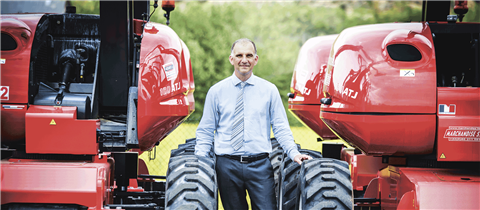
Rentuu: Easing the pain
Transparency can be an issue in the rental industry. This is a problem that Andrea Guzzoni, CEO of technology company Rentuu, came up against when managing the rental operations of Tanzanian company Jumia/Jovago several years ago.
“I realised how difficult it was for us to check the background of equipment, such as health and safety, and maintenance, online,” he tells IRN.
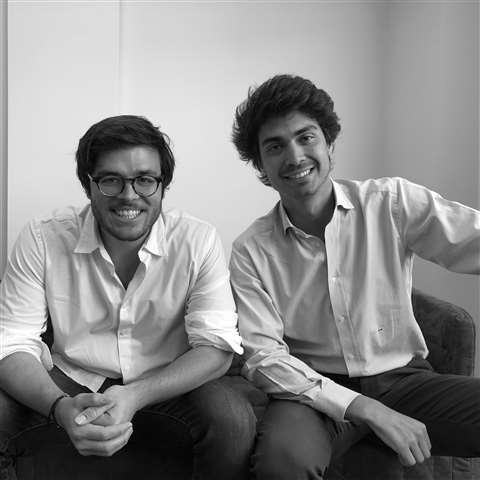
After doing some research, Guzzoni discovered that the problem was not specific to Tanzania but also existed in more developed rental markets like the Netherlands and the UK.
Helping mid-sized companies
Guzzoni, who has a background in economics, studied market research through data and digital marketing at Imperial College London. After five years of working around the world, following his studies, Guzzoni returned to the UK about five years ago to help mid-sized rental companies overcome the issue he had identified.
“Some of them are really good at what they do,” he says, “but usually rental companies hate two things: marketing and technology. It’s very far from their core business.”
After a couple of years spent developing digital technologies to support rental companies, in 2019 Rentuu caught the attention of easyGroup, the parent company of easyJet, founded by Stelios Haji-Ioannou.
A commercial agreement was reached whereby Rentuu was given the rights to two equipment rental brands, easyEventHire and easyToolHire, across 31 territories, including the EU member states, Switzerland and Monaco.
“We have the technology, easy has a strong brand,” says Guzzoni.
Suggesting that the rental industry is dominated by people in their 50s, on average, Guzzoni says one of the main advantages of having the easy brand is that it is well recognised by this target audience as one that they can trust to process online payments; “We saw it as the only way to really bring dynamic pricing and online booking to the rental industry.”
Through this agreement with easy, Rentuu has developed a business model that combines franchising with licensing.
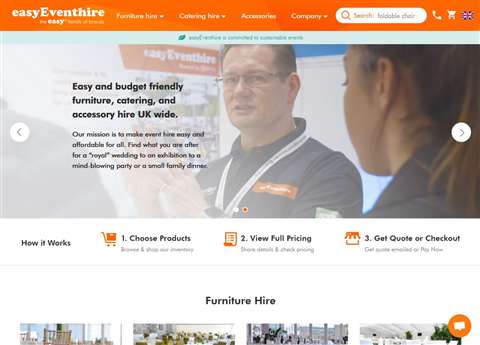
“We work with mid-sized businesses that are very good at what they do – they have a very strong regional presence – and we help them by giving them the brand and allowing them to run on our software.
“So basically, it’s franchising because there is the brand, and licensing because there is also our software that allows them to run their operation, plus the marketing we do.”
Divide and conquer
Taking the UK as an example, Rentuu is dividing it into regions – six areas in England, plus Northern Ireland, Wales and Scotland – and then looking to have separate rental companies managing each of those areas exclusively under the easyToolHire brand.
With the easyEventHire brand, there is one important difference though: a single company covers the whole of the country – in the UK, it is currently Event Hire UK, which has five depots across England.
The reason Guzzoni gives for this approach is that “events move”.
“For tool rental, usually 90% of our clients and jobs are very close to the branch. It’s very unlikely that someone orders machinery from very far away, while for events it’s completely different,” he says, adding that equipment rental requires maintenance, so the depot needs to be nearby, whereas chairs and tables for a wedding, for example, do not have that same need for proximity.
Explaining how it works, Guzzoni says, “We give assets to the companies but they don’t have to ditch their own brand they’re working on –
usually a family brand. So they can keep their own brand but also use the easy brand and be ‘easyToolHire Essex’ or ‘easyToolHire Kent’, for example. So it’s an opportunity for them to expand their network and get better marketing opportunities.”
So, once these rental partners have signed the five-year contract, they will continue to operate independently, with their own products, contracts, insurance, and so on, but they will be able to add the easyToolHire branding to things like their depots, equipment and delivery vehicles – effectively becoming a franchise.
On the licensing side of things, Rentuu provides an easyToolHire branded version of the company’s website that is enabled with functions such as online ordering and dynamic pricing, and also helps with marketing.
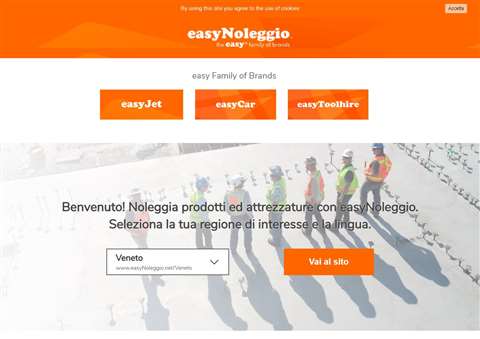
Integration process
Rentuu starts by integrating into the CRM (customer relationship management) system all the various touchpoints the customers have with the rental company; “We need to make sure that they find our partner easyToolHire online and that it’s very well integrated with the business, to make sure that their drive to pick up equipment from the store is successful,” says Guzzoni.
The next thing is to offer them the opportunity to introduce dynamic pricing.
“The difference between us and a consulting company,” says Guzzoni, “is that we have four years of experience doing this specifically for the rental industry.”
With regard to marketing, Rentuu reorganises the company’s calendar, since the companies it works with often do not consider seasonality and for which projects their products are being rented, according to Guzzoni.
“We look at the product data and create a very nice opportunity for the company to check seasonality, type of client and the project,” he says. “That’s important work. That structure is critical for our online marketing.” And an important part of it is understanding the lead time between a client placing an order and when they need it delivered, Guzzoni adds.
“So it’s much more personalised than a platform,” Guzzoni says.
Rentuu started as a platform but soon shifted away from this; “We realised that dealing with a small number of companies allowed us to really create a relationship and create value,” says Guzzoni. “And that’s why, when we got the opportunity with easy, we didn’t do it as a marketplace or as a franchise where everyone can add their logo and be part of a family. Instead we actually select certain companies… we go through due diligence for the companies, we make sure they respect all the health and safety standards in the UK and in other countries in Europe, and then we work with them.”
Selecting partners
When asked what the key criteria are for selecting rental companies to partner with, Guzzoni says, “The most important thing for us is the management of these companies.”
“It’s critical that we have business owners that want to create something new… We enable them to realise some of the dreams that maybe they really wanted to build for themselves but they couldn’t because it’s expensive.”
Guzzoni gives Mauro Brunelli as an example, the Director of Up Rent, with which Rentuu recently partnered in Italy to cover the Veneto region under the easyNoleggio brand (‘noleggio’ translates as ‘rental’).
“He has a very long-term vision of the rental industry and technology,” says Guzzoni.
“We’re really seeing the difference in Italy now in the rental space with the generation change,” he adds, “because there is not only a greater desire to accept and invest in technology but also a desire to fulfil all our checks, like health and safety, and corruption, to ensure they’re of a certain standard that for us, being part of a brand like easy and being a UK company, must be respected.”
In its search for rental partners, Rentuu is also looking for companies that are regional; “By regional this means they usually have three depots at least, but no more than seven. Our sweet spot is probably five depots. So it’s mid-size.”
But how does Rentuu go about finding the right companies? It consults rental associations.
“In Italy, for example, we partnered up with the Italian rental association. The Italian rental association director, Marco Prosperi, became our de facto country manager.”
This is because they are the ones who have the relationships with rental businesses and will know which ones are the best fit.
Industry advisors
Also, Josh Nickell, consultant with the American Rental Association, and Graham Arundell, CEO of Hire Association Europe (HAE) and Event Hire Association (EHA), are acting as industry advisors to easyHire.
Certain products work better than others on easyToolHire, such as forklifts, generators and gardening tools, Guzzoni says; “I don’t see things like cranes or scaffolding being rented through easyToolHire.”
“So we want these companies to identify what are the categories that, for their region, work very well on easyToolHire and then we can push those. So they can keep their own branding and original website maybe for bigger contractors, like bigger B2B accounts they have, and less for the B2C or smaller B2B cash clients.”
Guzzoni likens it to having two entrances to the business – one for larger clients paying by credit, and another for smaller customers paying by cash.
“This, for a rental company that maybe makes £8-10 million per year, is a very sweet opportunity because they can keep their brand for larger core clients but then also acquire many more clients through the easy brand.”
Rentuu’s launches of easyEventHire in the UK and easyNoleggio in Italy are only the beginning; “We are due to launch easyLocation in France and easyAlquiler in Spain, for tool hire,” says Guzzoni. “So we’re already having conversations with companies in France and Spain.”
Future plans
The company is also planning to launch easyToolHire in the UK in September 2020.
Guzzoni says, “If we keep growing at the same pace, we aim to have 20-30 companies on a European level by the end of 2021.”
He adds, “We have a lot of cool projects that we are building and that we know will make a difference to the industry in a few years. But with our partners we want to get there and make sure that what we’re building in the back in based on data and based on actual user experiences, because a lot of tech companies out there – as we used to be ourselves – are building something without being on the ground.”
Guzzoni says Rentuu has the advantage of spending time working in warehouses and industrial areas; “I think that’s what really makes the difference in terms of what we, on a product level, are building for the industry, because we are with them and we get to see what the pain points are on the ground, and not just in a separate office.”
So here we have a symbiosis. Rentuu leverages its intimate understanding of its partners’ pain points to help them succeed, which in turn drives Rentuu’s own success.
Setting standards
Guzzoni is enthusiastic about the opportunity this new business venture might present for franchised companies to cooperate by sharing best practices and setting high standards in the sector.
“How exciting it would be to bring together five Italian, five Spanish, five French, five English mid-sized rental companies at the same table,” Guzzoni says. “They’re all the same sort of mid-size local business, so nobody is really competing with each other. It’s just an opportunity to create a table where you never know where the best idea will come from.”
He adds, “We want to start standardising certain criteria that we believe are important for the future of the rental industry.”
This would mean a customer using easyToolHire in the UK could expect a similar level of service from easyNoleggio if they also had a project in Italy, for example.
While they are different companies, Guzzoni says customers will be able to rest assured that the way they operate, the quality of the machinery they are supplying, and the online experience will be of the same high standard.
Crowd funding
Rentuu has plans to launch a crowd funding campaign in the UK at the start of October.
“We have a healthy runway as a business, we have strong investors, but we think we are in that sweet spot where we can get a lot of our clientele and a lot of our supporters from the rental space to join us,” says Guzzoni.
“Not everyone has the same opportunity as Stelios in terms of liquidity but a lot of people maybe believe in the project and want to join us with, say, £250-500, and they can be part of this digitalisation of the rental space.”
He adds, “We’re going to really use this opportunity to expand in the UK market especially, to better structure new tech solutions, like the opportunity to self-pick-up and self-deliver.”



